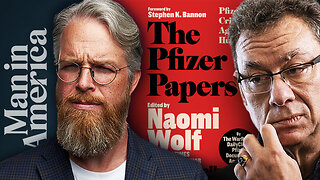Premium Only Content

Episode 2525: The De-Christianization of the West
Opening Prayer:
In the name of the Father, and of the Son, and of the Holy Spirit, Amen.
Heavenly Father, source of all wisdom and truth, we come before You in humility, seeking to grow closer to You through the treasures of our faith. Grant us the grace to detach from worldly riches and embrace the spirit of poverty as Your Son taught us. May we always seek Your Kingdom above all, and be faithful to the teachings of Your Holy Church. Open our hearts to the wisdom of the saints and the guidance of the Holy Spirit, that we may grow in holiness and love for one another. We ask this through Christ our Lord. Amen.
Will we explore the timeless teachings of the Catholic faith, rooted in the tradition of the Church. Today, we’ll dive into the spiritual value of poverty and how it leads us to greater humility, holiness, and love for others. Drawing from the wisdom of St. Thomas Aquinas, and the examples of the saints, we’ll reflect on Christ’s call to "be perfect" and how detachment from material wealth helps us grow in our relationship with God. Whether we are called to religious life or living out our faith in the world, the path of spiritual poverty is one that leads to a deeper union with Christ.
The Ruins of Christendom
We truly live in the ruins of Christendom. The world has become overtly secularized, but it’s important to understand that this did not happen overnight. The dechristianization of Western society, the culture in which the faith was once a vibrant, dominant force, has been done with purpose. There’s a simple cause of this that we’ll discuss today, one that may hit particularly close to home for Americans. While many look to various political or social movements as the primary drivers of this shift, there’s something deeper at work.
Let me offer you an example of a bishop who gets part of it. In a recent headline from Info Vaticana, Monsignor Gerardo Melgar said, "Today in Spain, families are mostly dechristianized." He is right to observe the family’s weakened role in transmitting the faith, a key factor in the dechristianization of the West. But what the bishop addresses is more symptomatic than foundational. You see, the problem runs far deeper than just family dynamics. The secularization of society was done on purpose rooted in a strange interpretation of America’s founding documents, the so-called separation of Church and state.
Separation of Church and State: A Deeper Look
This separation, so cherished in modern American political life, did not emerge directly from the First Amendment. Instead, it originates from a letter that Thomas Jefferson wrote to the Danbury Baptists. Jefferson described a "wall of separation" between Church and state, emphasizing that religion should not interfere with government, and government should not interfere with religion. This concept would eventually evolve into something more corrosive, contributing to the exclusion of faith from the public square, and making secularism the de facto belief system in much of the West today.
For Americans especially, this truth can be uncomfortable. The dechristianization of society is linked to the rise of secularism, and secularism is intertwined with our very notions of government. However, it’s not just politics at fault here. Materialism plays an even more insidious role.
The Materialistic Culture as Fertile Ground for Secularism
As we move further into this episode, we must confront a hard reality: materialism is the root cause of much of our secularization. As a retired priest, Father José María Itaburu, explains, “The dechristianization of the Church has been brewing for centuries,” and has accelerated in recent decades, especially in the post-Vatican II period. His words may be uncomfortable, but they speak to a critical truth: this phenomenon is driven by the explosion of wealth and material comfort in the 20th and 21st centuries.
We are living in the wealthiest civilization in history, and yet we are simultaneously witnessing one of the most aggressive waves of de-Christianization. The two are not unrelated. The pursuit of material satisfaction, the relentless accumulation of wealth, and the comfort that this wealth affords us have distracted us from the things that truly matter our faith, our relationship with God, and our role as Christians in the world.
Father Itaburu highlights this point by connecting material prosperity with spiritual poverty. It’s in times of hardship that people tend to turn back to God. However, as our society becomes more comfortable, more affluent, we have shifted our gaze away from Christ. And this comfort, this wealth, is fertile ground for the secularist culture to grow and spread.
A Warning from Scripture
Father Itaburu’s letter also calls us back to the Gospel. Christ Himself warns us of the dangers of wealth, telling us in the Gospels that it is harder for a rich man to enter the Kingdom of Heaven than for a camel to pass through the eye of a needle. And yet, we live in a society that idolizes wealth and success, equating a full bank account with a fulfilled life. This mindset is the very thing that has allowed secularism to flourish.
The Scriptures repeatedly call us to live in a spirit of poverty, if not in literal poverty. This spirit of poverty reminds us that material goods are fleeting, and that our true treasure lies in heaven. But modern culture teaches the opposite: it tells us that our worth is measured by what we own, not by who we are in the eyes of God. This is the spiritual danger of materialism, and this is why secularism has taken such deep root in our world.
A Call to Action
What, then, is the solution? The answer is simple, though not easy. We must return to a spirit of poverty. We must resist the temptation to measure our success by worldly standards and instead embrace the call to live for Christ. We must also rebuild the family as the primary transmitter of the faith, teaching our children that their worth comes not from their possessions, but from their relationship with God.
In this age of secularism and materialism, we, as Catholics, are called to stand apart from the world. We are called to be in the world, but not of the world, to remember that our true home is not here, but in heaven. It is time to reject the culture of wealth and comfort and to embrace once again the Gospel message of poverty, humility, and dependence on God.
The Idol of Comfort and the Curse of Wealth
Now, let's begin by turning to the Gospel of Matthew, Chapter 19. Here, we find Jesus telling us that "it is easier for a camel to pass through the eye of a needle than for a rich man to enter the Kingdom of Heaven." At first glance, this can seem harsh, especially in our modern context where wealth is seen as a blessing, something to aspire to. But Jesus isn’t condemning wealth in itselfHe's warning about how riches and the pursuit of comfort can dominate our hearts and pull us away from God.
Riches and Idolatry
We live in a world where people whether they’re wealthy by today’s standards or not idolize money. The modern Western world, particularly, has turned wealth into a false god. In Matthew Chapter 16, Jesus says: "Woe to you who are rich, for you have already received your consolation. Woe to you who are full now, for you will go hungry." The temptation to see money, success, and comfort as ultimate goals is real and, for many, all-consuming.
But the commandment "You shall have no other gods before me" is just as relevant today as it was when it was given on Mount Sinai. We've just changed the form of the idols we worship. We no longer bow before statues of Baal, but how many of us sacrifice our time, energy, and even our faith on the altar of financial security or the pursuit of material comfort?
Let’s reflect on this: How much of our daily lives revolve around making ourselves comfortable, avoiding suffering at all costs, or working endlessly for a "better life" that is defined by the standards of the world rather than by the Gospel?
The Comfort Crisis
This idolatry of comfort is at the very heart of secularization. In fact, as we’ve seen the rise of modern comforts, technological advancements, and unprecedented wealth over the last century, we've also seen a sharp decline in religious devotion. We have filled our lives with so many distractions and conveniences that we no longer have the time or perhaps even the desire to truly encounter Christ.
It’s ironic, isn’t it? We have more tools at our disposal to make our lives easier, and yet we feel busier and more distracted than ever. This is a point often missed: comfort isn’t always a blessing. In many cases, it becomes a curse when it pulls us away from the disciplines of the faith, from prayer, from fasting, and from the works of mercy that challenge us to live the Gospel authentically.
In Luke Chapter 6, Jesus tells us: "Blessed are you who are poor, for yours is the Kingdom of God." Christ blesses poverty because, in poverty, we are not tied down by material attachments. The soul that is free from the idol of wealth is free to fully rely on God.
Mary herself proclaimed this reality in her Magnificat: "He has filled the hungry with good things, and the rich he has sent away empty." There’s a deep, profound truth here: God fills those who are empty, those who rely on Him, while the rich, full of their possessions and self-reliance, are left spiritually barren.
The Decline of Christian Culture
Now, let’s turn our attention to the cultural impact of wealth. The Western world, once rich in Christian faith, has become spiritually poor with the explosion of wealth in the 20th century. When Europe and America were poorer, they were more faithful. Families were larger, communities tighter, and the rhythm of daily life often centered around the Church. People had less materially but were more connected to their spiritual roots. They worked hard, prayed often, and understood the value of sacrifice.
But with the rapid rise of technology, consumerism, and luxury, something shifted. Comfort and convenience became the new gods. Instead of finding joy in the simplicity of life and the joy of the cross, modern man now seeks happiness in fleeting pleasures. The irony, of course, is that this endless pursuit leaves us more anxious, more dissatisfied, and further from God.
This de-Christianization of society didn't happen overnight, nor is it limited to the secular world. It has trickled into the Church as well. When our hearts are full of the world’s temptations, it’s no wonder that the Church herself feels weak. As St. Paul warned in Romans Chapter 1, "Professing to be wise, they became fools, and worshipped created things rather than the Creator."
Time—the Most Precious Commodity
In today’s world, we may have an abundance of material goods, but we’re impoverished in the one thing we cannot buy: time. Many of us claim we don’t have time for Mass, prayer, or the rosary because we’re overburdened. Overburdened with what, though? Social media, endless entertainment, work, and the constant drive for more? We’ve sacrificed our spiritual lives for temporal gain. The Church, in her wisdom, calls us to fast, to renounce some of these distractions so that we can recalibrate our lives and refocus on God.
The Evangelical Counsel of Poverty – Path to Perfection
Throughout Church history, poverty has been a hallmark of those striving for Christian perfection. But how does this ancient wisdom apply to us today? Let’s unpack this.
When Christ spoke to the rich young man, He gave a profound invitation: "If you wish to be perfect, go, sell your possessions, and give to the poor, and you will have treasure in heaven. Then come, follow me" (Matthew 19:21). This isn’t just a command to live a life of material detachment it’s a pathway to growth in holiness.
The evangelical counsel of poverty, along with chastity and obedience, has long been recognized as one of the safest and most effective ways to grow in holiness. This understanding was not something the Church created on a whim, but something she saw from the beginning in the lives of Christ's closest followers His apostles and the early communities of consecrated virgins.
Vatican II’s document Lumen Gentium speaks directly to the universal call to holiness. And yet, this call to holiness must be understood in the light of Tradition. While all Christians are called to holiness, the Church has never taught that every state of life is equally ordered to perfection. Some ways of life, such as religious life with its vows of poverty, are more favorable for attaining sanctity.
This is not a slight on the lay vocation, nor does it imply that the rich cannot be holy. Rather, it highlights the reality that wealth, when not managed with spiritual wisdom, poses significant spiritual dangers. St. Thomas Aquinas and other Church fathers remind us of this truth.
We need only look to the warnings Christ Himself gave about wealth. “Woe to the rich,” He says, and in the parable of the sower, He speaks of how “the cares of this world, and the deceitfulness of riches choke the word, and it becomes unfruitful” (Matthew 13:22). The rich young man walked away from Christ’s invitation to follow Him, not because he was unwilling to be good, but because he was unwilling to detach from the wealth that anchored his heart to this world.
Poverty, on the other hand, frees the heart. It creates space for deeper love of God and neighbor. It leads us to rely completely on God for our daily bread, and it keeps us humble, as we realize that all we have is gift. This is why religious orders have taken poverty so seriously from the earliest days of the Church.
In the communities of consecrated virgins, and later in contemplative and active religious communities, poverty was embraced as the most favorable way to follow Christ. This is why these states were called states of perfection. Unfortunately, in recent times, this name has been diminished, as if all vocations are equal in their capacity to lead us to holiness. This is not what Christ taught, nor is it what Lumen Gentium teaches.
Now, let me share a personal story. Early in my Catholic life, I received spiritual direction from a conservative priest. He was adamant that the idea of a "vocation to the single life," as it's often discussed today, was a modern invention. He believed that God’s call to "be fruitful and multiply" applied to all, except those who enter religious life. Priests and religious fulfill this in a spiritual sense, by bringing souls to Christ. But this idea that the single life is a vocation in itself? He saw it as something foreign to Tradition.
While I don’t dismiss the value of consecrated virgins living in the world, we must be cautious not to lose sight of the higher calling of religious life, particularly the embrace of poverty. For Christ Himself set this path apart: “Come, follow me,” He told His apostles, “and they left everything and followed Him” (Luke 5:11).
Poverty, celibacy, and obedience are not arbitrary restrictions they are liberations from the attachments that keep us from fully growing in Christ. "Blessed are the poor in spirit, for theirs is the kingdom of heaven" (Matthew 5:3). Christ did not mince words about the dangers of wealth, and His warning echoes in the teachings of the Apostles. St. Paul reminds us that the "love of money is the root of all kinds of evil" (1 Timothy 6:10), and St. James says, "Come now, you rich, weep and howl for the miseries that are coming upon you" (James 5:1).
Pope Pius XII taught in his time, echoing this ancient wisdom, that it is nearly impossible to keep one’s heart completely detached from earthly goods unless one actively distances themselves from the allurements of material wealth. This isn’t a condemnation of those who are wealthy, but it’s a recognition of the difficulty they face in preserving charity and maintaining a focus on eternal treasures.
St. Thomas Aquinas put it perfectly: voluntary poverty is the first foundation for acquiring the perfection of charity. Riches, though not evil in themselves, make it difficult to live with the single-minded devotion to God that holiness demands. This is why Christ said, "How hard it is for a rich man to enter the kingdom of heaven" (Matthew 19:23). It’s not impossible, but it’s harder because wealth can easily become an idol.
So, where does this leave us? Whether we are called to a life of material poverty or simply a poverty of spirit, the message is clear: detachment from worldly goods is essential for spiritual growth. We are called to use the gifts we have to help others, especially the poor, and to always keep our eyes on heaven.
Remember, even if we’re not religious, we must follow the example of those who gave up everything for Christ, not just by giving alms, but by living with hearts free from the love of wealth.
Christ said, "You cannot serve both God and money" (Matthew 6:24). Let us strive to be rich in what matters to God, not just in the things of this world.
Thank you for listening to this episode of "Tradition and Truth." Until next time, keep the faith, and let us all seek the true riches the treasures of heaven.
Conclusion:
As we conclude today’s reflection, we are reminded that while wealth in itself is not sinful, it can become a great obstacle to our path toward perfection. Christ’s call to the rich young man, "If you wish to be perfect, go, sell what you have, and give to the poor," challenges us even today. This is not only a call to those in religious life, but to each of us in our own vocation—whether we are called to consecrated life, marriage, or the laity—to live a spirit of detachment and love for our neighbor.
Through the Church's teaching, especially in Lumen Gentium, we understand that the evangelical counsels of poverty, chastity, and obedience provide a "more favorable, safe, and expeditious way" to holiness. In embracing poverty, we are drawn into deeper union with Christ, who Himself became poor for our sake, that we might become rich in grace.
The modern world often glorifies wealth, comfort, and self-sufficiency, but we are called to live counter-culturally, placing our hope not in material goods but in God alone. As we reflect on today’s discussion, may we commit ourselves to living in the spirit of poverty, in whatever way God calls us, always remembering that our true treasure is in heaven.
Closing Prayer:
In the name of the Father, and of the Son, and of the Holy Spirit, Amen.
Lord Jesus, You have called us to follow You in simplicity and humility. You showed us that poverty is not just the absence of material things but a way of being fully dependent on the Father. We ask for Your grace to live in this spirit of detachment, that we may love You above all and serve our brothers and sisters with generous hearts. Help us to resist the allurements of this world and to focus on the eternal riches of Your Kingdom. Through the intercession of the Blessed Virgin Mary, St. Joseph, and all the saints, may we grow in holiness and remain faithful to Your call. Amen.
In the name of the Father, and of the Son, and of the Holy Spirit, Amen.
-
 2:21:35
2:21:35
Price of Reason
11 hours agoThe Establishment WORRIES about Elon Musk AGAIN! Superman Trailer Discussion! Sonic 3 Review!
39.6K2 -
 1:14:54
1:14:54
Steve-O's Wild Ride! Podcast
14 hours ago $15.64 earnedZac Brown Reveals The Secrets To HIs Success - Wild Ride #247
56.5K12 -
 4:16:43
4:16:43
JdaDelete
8 hours ago $11.48 earnedProject Zomboid with the Boys | The Great Boner Jam of 2025
35.5K -
 6:00:08
6:00:08
SpartakusLIVE
9 hours agoYoung Spartan STUD teams with old gamers for ultimate BANTER with a SMATTERING of TOXICITY
28.1K -
 1:50:39
1:50:39
Kim Iversen
10 hours agoShocking Proposal: Elon Musk for Speaker of the House?! | IDF Soldiers Reveal Atrocities—'Everyone Is a Terrorist'
73.9K164 -
 43:27
43:27
barstoolsports
13 hours agoOld Dog Bites Back | Surviving Barstool S4 Ep. 9
130K4 -
 5:13:04
5:13:04
Right Side Broadcasting Network
7 days agoLIVE REPLAY: TPUSA's America Fest Conference: Day One - 12/19/24
182K28 -
 1:06:01
1:06:01
Man in America
1 day agoPfizer Has Been Caught RED HANDED w/ Dr. Chris Flowers
59.8K16 -
 2:24:15
2:24:15
Slightly Offensive
11 hours ago $17.85 earnedAttempted ASSASSINATION of Nick J Fuentes LEAVES 1 DEAD! | Guest: Mel K & Breanna Morello
49.9K44 -
 1:43:08
1:43:08
Roseanne Barr
11 hours ago $28.29 earned"Ain't Nobody Good" with Jesse Lee Peterson | The Roseanne Barr Podcast #79
83.7K49